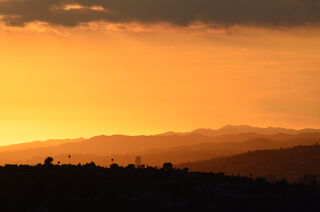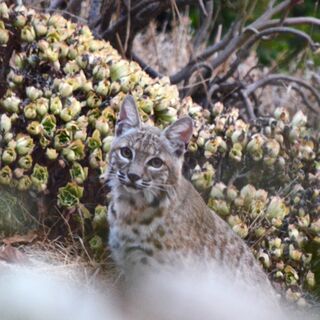Politics
In Defense of Los Angeles
Misunderstood, Los Angeles is symbolic of every segment of American diversity.
Posted September 21, 2020 Reviewed by Lybi Ma

California is burning. If you’ve never lived in a state that’s burning, imagine living every moment in a cloud of campfire smoke. Except, the smoke is somebody’s home entering your lungs. The smoke is playground toys and petrochemicals entering your lungs. It's not an exaggeration to say that, on the west coast, fires plus the pandemic make it feel like a dangerous time to be breathing.
Recently we watched a most unusual Emmys telecast. In previous years, we could see searchlights and helicopters from our hillside home overlooking Los Angeles. Everyone angling for a view of the stars. Award show weekends usually electrify the city, but this year the sky was quiet. As we watched from our living room as celebrities accepted awards from theirs, I toggled between TV and Instagram. A farm in the San Gabriel Mountains had been posting frequent updates as the 100,000-acre Bobcat Fire swept closer to their home. With only a few feet between their barn and the flames, photos showed their property being saved by firefighters. Red trucks surrounded by scorched gray ranchlands.
We have 10 million people in Los Angeles County. Surely more farms than film studios. But America doesn't know us for our barns. They don't come from around the world to see our strawberry fields. They come to see Hollywood. (Spoiler alert: it’s pretty filthy.) Opinions about L.A. are, perhaps more than any other U.S. city, deeply formed and strongly polarized. A confusion of nightly news and movie scripts. History blurred with fantasy. Gangster films and protests and politics. Skid row junkies and bleach-blonde beach bums. I have family who say they wouldn’t be caught dead here. I think they mean it.
It’s too bad because, if they did visit, they’d get a completely different guided tour. When they wake up that first morning, they might just find a warm loaf of sourdough delivered to my doorstep by my neighbor. He used to work on a late-night show, now we swap eggs for bread. Oh yeah, I rescue and raise poultry—right here in my backyard. L.A. allows chickens and our property is zoned for horses. Take a hike in Griffith Park or a stroll along the Los Angeles River and you’ll probably see horses. Here in the northeast side of the city, overlooking skyscrapers and Dodgers Stadium, many of us have chickens. Some even have pigs, sheep, or goats. Several neighbors have beehives. That’s just Los Angeles.
My neighbor across the street owns a convenience store in a different part of the city. During the pandemic, when each day’s trip to the mailbox is another chance to chat, he’s made sure I know that he’s here for us if we need anything at all. We once helped him find his dog. That’s just how it is in a real neighborhood, with real people who really care about one another, in a real city, which is every city in America.
I admit, when I say its name, L.A. still sounds like a sunset license plate on the back of an '80s red Ferrari. But with our wildlands burning and our good people feeling tired, smoke-choked, and drought-weary, we need our nation to change how they speak of us. We are not a plastic surgery city. We are as much concrete and steel as we are rugged individuals and scorched earth. We are all the things that people everywhere care about. We need our nation to see all parts of us because this is not a movie set; this Los Angeles is real and it is burning.
Gentrification is often talked about here, with McMansions and chain stores overtaking old neighborhoods and mom-and-pop shops. Yet, come by on a Friday night when mariachi music tries to keep our famous sunsets awake. When every soccer field is alive past dark. Where taco trucks try to keep up with lines down the sidewalk and the ice cream truck still plays Christmas carols in July. Come by and tell me that’s not real.

On any day of the year, we can go to the beach to see stars that are sea-stars lounging in tidepools. If wildlife’s your thing, let’s skip the zoo and just stay home; where last week a bobcat stopped by our patio for a drink. During migration season, birds arrive in gowns of every color and, in Los Angeles, our mountain lions are celebrities of their own. Don’t be surprised if a black bear takes a dip in a Pasadena pool: in Los Angeles, we know how to co-exist with our neighbors. Isn’t this place just wild?
You may have heard we had an earthquake a few week ago. It jolted us awake. It jolted farmers and actors and the homeless and the privileged awake. Shortly after it happened, we turned on the news and recognized the anchors on Channel 7. I recognized those nightly faces just like I did when I lived in that small town back home. It’s the little things in a big city that bring comfort on shaky nights. It’s the little things that are just the same here as they are everywhere. Like a loaf of bread on the doorstep. Like a neighbor at the mailbox. Like how the air is the same for everyone who breathes it: burned down fences in one nation that needs to see itself reflected back in 10 million different ways in every single town.


